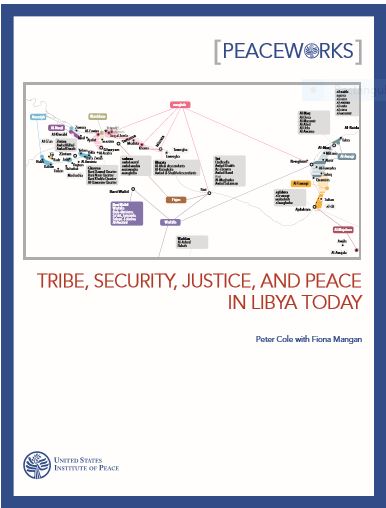By Sami Zaptia.

London, 3 September 2016:
There is a renewed role for tribes as guarantors of social stability and providers of security and justice services in Libya since the 2011 revolution, a report says.
The report, published yesterday by the United States Institute for Peace (USIP) and authored by Peter Cole and Fiona Mangan, says that after the 2011 Libyan revolution that toppled Qaddafi and destroyed many state institutions, tribes and armed groups stepped in to fill the vacuum.
The trend increased after the collapse of Libya’s central state security in 2014.
The report says that governance in Libya has long been influenced by tribal leaders alongside central authority.
Tribalism and its meaning for Libyans, though, has evolved over the centuries, initially in response to outside powers and more recently to internal circumstances, it adds.
The first efforts to extend central government authority, introduced during the Ottoman era, were continued through the Qaddafi era and fueled significant conflict between tribes.
In the wake of the 2011 revolution that destroyed what little remained of state institutions, tribes and armed groups stepped in to fill the vacuum. This trend increased after the collapse of central state security in 2014, the USIP report explains.
It explains that when tribal power structures are stable, they dominate policing and security services. When they are unstable, they lose control and sometimes rely on armed groups.
Tribal influence over police is derived from the ability of tribes to staff local police structures and the need of the police to secure tribal permissions to act in tribal territories, says the report.
On the otherhand, tribal influence over justice actors is more limited. Many cases, though, do not make it to court, either because they are resolved through tribal arbitration or because local instability prevents courts from operating.
Libyans nonetheless overwhelmingly desire a security and justice system provided by the state and independent of tribal influence, it adds.
Support for informal or nonstate justice systems is minimal. Nonetheless, a significant minority (in some areas majorities) see tribes as effective security providers, perhaps because state providers have not been effective.
Reform efforts need to draw on tribal expertise and experience in peacemaking and negotiation, bearing in mind what modern tribalism means to Libyans, the report says.










